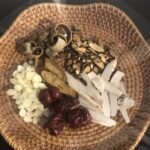Chinese Herbal Medicine
Chinese herbal Medicine is a traditional system of Medicine that has been practiced for thousands of years in China and is still widely used today. It involves the use of various plant, animal, and mineral substances to promote health, prevent illness, and treat a wide range of medical conditions.
What is Chinese Herbal Medicine?
Most Chinese herbal formulas rely on botanical ingredients, encompassing components like leaves, blooms, seeds, stems, bark and roots. Examples are ginger, dandelion, date, cinnamon and liquorice. Occasionally, minimal quantities of mineral or animal-derived substances such as shells and bones might be integrated into the formula. However, it is important to emphasise that materials derived from endangered or protected species are strictly excluded from prescriptions. These substances are typically combined into complex herbal formulas, which are customised for each patient based on their individual patterns of disharmony according to Chinese Medicine principles.
What to expect at a Chinese Medicine consultation
The practitioners will begin with a thorough assessment of the patient’s condition, using specific diagnostic techniques such as pulse diagnosis, tongue examination, and a detailed medical history. The goal is to identify patterns of disharmony in the body. Based on the diagnosis, a practitioner will prescribe a specific herbal formula, which typically includes a combination of herbs, each chosen for its particular properties and synergy. The formula is customised for each individual and may change over time as the patient’s condition evolves. The herbs can be taken in various forms, including decoctions (boiled herbal teas), pills, powders, or tinctures. The practitioner will provide instructions on how to take the herbs.






